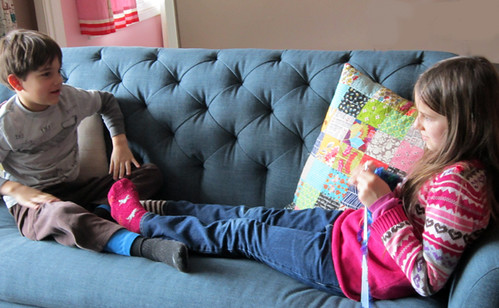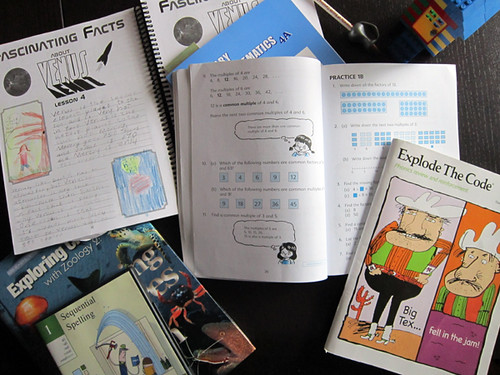Homeschool Chronicles: What Has + Hasn't Worked

Look at that, it's almost March already. Wow, we only have a few more months of school! Summer vacation means more playing, more
sewing
and more kid-bickering (it's true, but let's focus on the positives).
Yaaaaay!
Actually, I'm really anticipating our next school year this fall. We've formed a teaching co-op with two other homeschool families to start then. We'll be meeting once per week and each teaching a subject we're passionate about. I'm teaching writing!
Ok friends, I haven't written a Homeschool Chronicles since early December. Want to know why? I've felt shy about how much I change what we're doing. I know most folks believe in the scientific accuracy of schooling by state standards. And here I am schooling "ad hoc" and flaunting it.
Even though I'm using my tiny voice right now
, I actually believe flexibility is a great strength of homeschooling. So, today I've put on my big girl panties and resolved to air my dirty laundry bullet point style. In the last few years, this is what's worked and.... what hasn't.
What Hasn't Worked
yes, best start with that
Exploratory Handwriting. When Aria started copying letters (and soon books) at a very young age, I adhered to a "better late than early" philosophy and allowed her to discover handwriting organically. Turns out, incorrect patterns of letter formation and improper pencil grip are really hard to stamp out. I've found it's best to teach the correct way to form the letters, making strokes from the top down, from the very first. Insist on a proper pencil grip or buy grippers to enforce one.
Dictation. Central to the Bravewriter language arts programs is practicing regular dictation. Sure it's beneficial, but Aria detests it. I decided it wasn't worth so much stress, when there are other ways to teach writing.
Spelling Tests. Passing spelling tests does not a good speller make. All that stress! I've seen my children pass the test but magically lose that information a few days later.
Project Hour. I outlined in my Bucket System post that each child was to have one hour of project time following morning school bucket work. 2 months in, I discerned that Liam's project time was not very fruitful. Since he doesn't yet read fluently and he's not really a self-motivator, he benefits more from parent-directed teaching. Aria is seriously motivated and independent, so she wasn't restraining her project time to that hour anyways. In fact, she preferred to do her projects during wind-down time in her bedroom at night (and at random times throughout the day).
Assigned Fiction Reading for Language Arts. I have always loved to read, and yet I often chaffed under assigned fiction in school. Fiction is all about enjoyment! Although I was drawn to the way Bravewriter programs integrate great books into language arts, requiring certain books and using them for assignments takes a lot of fun out of reading. I'm still working in historical fiction as part of our history program, but for language arts she can read whatever she darn well pleases. Aria reads fiction often during reading bucket and on her own time. Bravewriter just didn't fit for us this year. Maybe in older years we'll return to assigned fiction for language arts.

What Has Worked
here's what I know
Choice. So key! Allowing Liam to choose books for reading practice made all the difference. When I gave Aria the choice of when/how much of her math book to do (with the understanding that she was to complete it by next school year) her passion for math flared up BIG TIME. My Bucket system (students choosing what work to do within a particular theme, such as writing) has created so much peace and positive learning in our home. Give them several good options to choose from. Then, let them choose!
Variety. Honestly, the kids and I don't get bored with school. We keep things moving along, with studies to suit our interests. Sometimes we've worked in blocks on monthly rotations, focusing for a time on history/math and next month on language arts/science. Right now with Liam, I am alternating his main lesson time between language arts and math on a weekly basis. This reduces his language arts stress (though he is doing great, he still gets fatigued). Besides shifting our focus, we also use multiple resources to cover most subjects. Usually, the point is not to "get this done" by the end of the year, but rather to keep going at a healthy, engaged pace.
Favorite Curriculum. Any curriculum recommendation reflects the education philosophies of the teacher and the temperment/strengths of the child. Keep that in mind!
Apologia Sciences. These books go deep on a narrow topic and include fun experiments. Aria discovered her passion for science through the Astronomy book in 2nd grade. She's now eagerly working through the series. The student journals encourage note-taking and illustrating, plus review through answering questions. Note: This is a faith-based series.
Enki 1st Grade Math. I love how this curriculum introduces pivotal math concepts and all four math processes through story, while also providing worksheets and games for traditional math practice. Both of my children do well with math, to which I partially credit this excellent foundation in story learning.
Singapore Math. This rigorous program asks a lot more of kids than other math programs I've seen on the market. It goes beyond simple word programs to complex ones that require kids to make new connections. Mental math is also prioritized. Aria can generally learn this math from the textbook without my help, so it is convenient yet rigorous.
Sequential Spelling. We've been happy with this non-phonics spelling program. Here, spelling is taught through pattern/word association and lessons include some long, interesting words. No tests, just practice!
Explode the Code. Any phonics work we do is through these playfully illustrated workbooks. Kids can do them independently. I like a mix of phonics and context (whole word) reading, so this is a nice element for us.

Read/Discuss History. We enjoy history! We've worked through various books over the years, including historical fiction and non-fiction designed for FUN reading, not textbooks. I think the key has been to read interesting books aloud and discuss as we go. The kids learn lots of vocabulary this way too! The value of history lies not so much in dates and names as in ideas, patterns and connections. No tests required because they've just told me what they know. What's not to like?
Field Trips. But you knew that.
Well, that feels better. Like I've said before, our homeschool is a
. So is life, right? When I think about how my kids are doing overall, I am always grateful we've walked this path. I know it's not for everyone, but I like to spread the word that it can be a good option should the need or desire arise.
If you're considering homeschool, I wonder if you'd be interested in a redo of
? It's a two-week online course designed to acquaint you with your options, while helping you discern the unique path that's all your own. Homeschool Handmade is for anyone just thinking about homeschooling, wanting to understand it better and visualize how it works. It's even more ideal if you've decided to homeschool and are
kind of
starting or Not Starting Yet or turning around in circles, not quite sure if you're starting... or not. And let me know what timing would be good! April? May?
xo,
Rachel